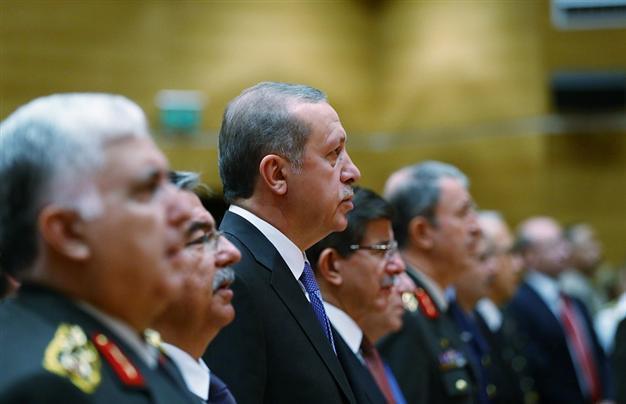HDP has inorganic link to PKK: Erdoğan
ANKARA

DHA Photo
President Recep Tayyip Erdoğan has toughened his position against the People’s Democratic Party (HDP) by implying that it has ties with the outlawed Kurdistan Workers’ Party (PKK) and acts as a parliamentary extension of the PKK. Erdoğan’s statement came only two days after HDP officials called the PKK to disarm and cease armed conflict against Turkey.“The [PKK’s] extension in parliament should do its part as we still receive news of deaths from the southeastern region in our country. Some terrorists groups can still open fire at minibuses and we face attempts of bombing an important dam in the region,” Erdoğan told reporters, after he performed his Ramadan prayer in a mosque in Istanbul’s Ataşehir district early July 17.
HDP’s Selahattin Demirtaş issued the call for the disarmament of the PKK late July 14 a day before he met with Prime Minister Ahmet Davutoğlu to discuss coalition partnership. Demirtaş dismissed claims that his party had any organic tie with either the PKK or the Kurdistan Communities Union (KCK) that threatened the government by ending cease fire if it does not resume talks for ending the Kurdish question. “But we know based on the intelligence we gathered that there is an inorganic tie,” Erdoğan said.
Erdoğan also said he did not recognize the term “Dolmabahçe Agreement,” a document outlining 10-item list of priorities for the resolution of the Kurdish peace process that was announced on Feb. 28 in Dolmabahçe Palace of İstanbul. The document was prepared and announced by Deputy Prime Minister Yalçın Akdoğan and HDP Istanbul deputy Sırrı Süreyya Önder and was regarded a key phase of the peace process.
“I do not recognize the phrase ‘Dolmabahçe Agreement.’ There is a government. So there is a political party with its grassroots [from the PKK]. If there is a step to make toward the future of our country, this should be made in parliament. There cannot be an agreement with a political party that is being supported by a terrorist organization,” said Erdoğan.
Erdoğan also said he could not forget the Oct. 6 and 7, 2014, incidents, a week of protests which erupted over the Turkish government’s perceived inaction toward the Islamic State of Iraq and the Levant (ISIL) militants’ siege of Kobane, which left 50 people dead and scores injured.
“Who can make an explanation to the incidents on Oct. 6, 7 and 8? It is clear who made the call [for people to take to the streets],” he said, implying the HDP called on people to protest the Turkish military’s perceived inaction toward the siege of Kobane, which caused the deaths of dozens of people in a police crackdown.
Akdoğan: Dolmabahçe not on our agenda
In the meantime, only hours after Erdoğan spoke, deputy Prime Minister Akdoğan said the Dolmabahçe Agreement was not on the government’s agenda and the issue was not discussed during Davutoğlu-Demirtaş meeting, in an interview with the Anadolu Agency July 17.
As the owner of the Kurdish peace process, they will continue to stick with its content Akdoğan said but added: “But it will be the new government that will decide how this process will run, what will be its title, scope, and methodology. There is currently intensification of the need and demands for security of the people in the region. We have to intensify our struggle against elements that threaten our people’s comfort and security as well as their rights and freedoms. This is the requirement of being a state.”
In an interview late July 16, Akdoğan underlined the importance of the peace process to the AKP. “Getting sufficient votes [to pass the election threshold] takes you nowhere in the [Kurdish] peace process. It is the existence of the AKP that can advance the peace process. The peace process exists only with the AKP,” Akdoğan said, indicating the HDP’s bypass of the election threshold was not enough to solve the Kurdish problem alone and that the process would make progress only with the AKP.
















